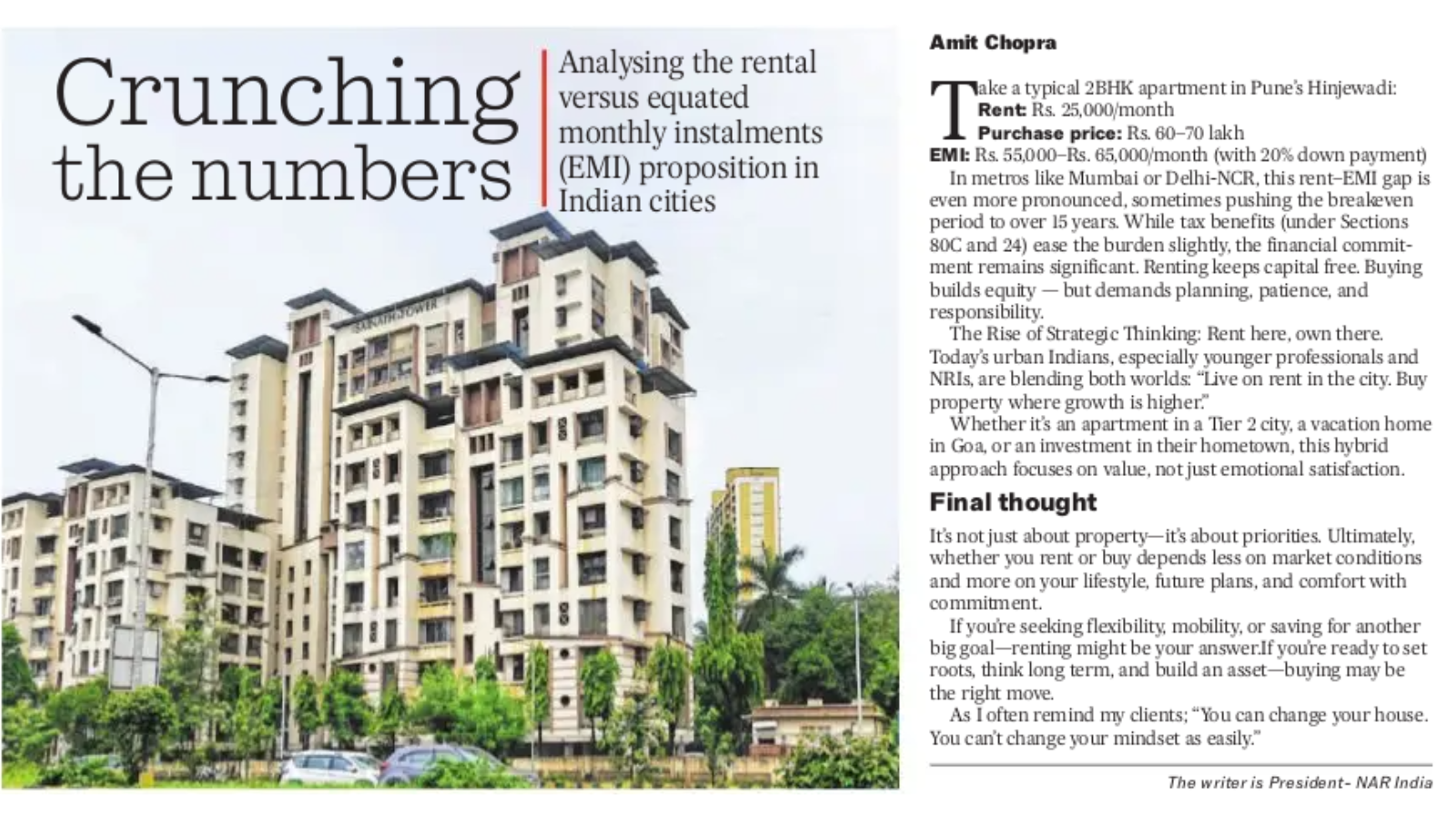
Renting vs Buying in India: Divergent Mindsets, Distinct Priorities
By Escala Admin Posted in News On July 23, 2025
Renting vs Buying in India: Divergent Mindsets, Distinct Priorities
By Amit Chopra, President, NAR-India & Founder, Escala Realty
In India, the decision to rent or buy a home isn't just financial—it's deeply personal, often emotional, and reflective of one's stage in life, risk appetite, and long-term goals.
Over three decades in Indian real estate, I've observed that renters and buyers operate with entirely different priorities and mindsets. This divergence shapes not just what they choose, but how they choose.
🧭 The Renter’s Priorities: Practical, Present-Focused
For those looking to rent a home, convenience and cost-efficiency take center stage. The focus is often short-term, guided by mobility, ease of access, and the intent to spend as little as possible on setup.
Some key renter priorities include:
Location, location, location: Proximity to the workplace, schools, or transport hubs outweighs the size or prestige of the property.
A landlord who doesn’t micromanage: In many Indian cities, a reasonable landlord and a tenant-friendly society can mean the difference between a peaceful stay and daily friction.
Minimal investment in interiors: Renters prefer semi-furnished homes or those where basic appliances are provided, as spending on interiors for a non-owned property seems wasteful.
Affordability over aspiration: Rent should fit comfortably within monthly budgets. It's common for renters to choose average buildings in premium areas over premium flats in average locations.
Flexibility over permanence: Most renters are open to relocating again within 11 to 22 months depending on career or lifestyle shifts.
In short: Renters are content if the house meets most of their current needs—future needs are a bridge to cross later.
The Buyer’s Mindset: Long-Term, Emotionally Anchored
For most Indians, owning a home is a major milestone—an emotional symbol of stability and status, in addition to being a financial investment. Homebuyers often stretch their budget, make sacrifices, and compromise on lifestyle to achieve this dream.
Some distinct buyer priorities include:
Long-term suitability: Buyers think beyond the present—whether the house will meet their needs 5–10 years down the line, especially in terms of size, layout, and neighbourhood quality.
Willingness to travel further: Unlike renters, buyers may accept a longer commute to own a home in a better society or with higher appreciation potential.
Owner-dominated societies: There's often a preference for communities where most residents are owners, leading to better upkeep, more consistent rules, and greater pride in maintenance.
Stretching beyond affordability: Many buyers go slightly beyond their financial comfort zone—either by taking larger loans or compromising on discretionary spending—to afford a home they can grow into.
Asset-building mindset: Buying is viewed not just as a housing solution but a wealth-creation tool. There’s faith in the capital appreciation of Indian real estate over time.
In essence: A buyer doesn’t just seek a house—they seek a future, and they're willing to forego some present comforts to get there.
🧮 Financial Realities in the Indian Market
In Indian metros like Mumbai, Delhi-NCR, and Bengaluru, the EMI vs rent differential is a common factor in this debate. For example:
A 2BHK in Bengaluru’s Whitefield may rent for ₹35,000/month, while buying it could mean an EMI of ₹60,000–₹70,000.
In Pune’s Hinjawadi, rent may be ₹25,000, but the same flat might cost ₹60 lakh—suggesting a decade-long breakeven period depending on appreciation.
While EMIs build equity and offer tax breaks (under Sections 80C and 24), they also require high upfront costs—down payment, stamp duty, registration, and maintenance. Renting, by contrast, allows individuals to redirect that capital to business, stock markets, or simply build liquidity.
💡 Expert Insight: It’s Not Just Math, It’s Mindset
What I’ve seen time and again is that this decision is rarely purely financial. It’s about stage of life, clarity of goals, and personal philosophy.
A young techie on a two-year project in Gurugram may choose to rent a modern 1BHK in DLF Phase 3, valuing flexibility.
A family with school-going children in Goa or Ahmedabad may prefer to buy a home in a quieter neighbourhood with long-term livability.
A senior executive based in Delhi with transferable roles may rent a home in the city but invest in a retirement property in Dehradun or Goa.
🔄 The Rise of Hybrid Thinking
Increasingly, Indians are warming up to a more nuanced approach:
> "Rent where you need to live. Buy where it makes financial sense."
This shift in mindset is especially strong among NRIs and urban professionals who prefer to rent for lifestyle and buy for investment.
🏁 Conclusion: Know Your Lens
Whether renting or buying, the decision must align with your stage in life, income flow, future visibility, and lifestyle goals.
Renting is tactical—a way to live lean and agile.
Buying is strategic—an act of anchoring and building.
Both paths are valid. What matters most is self-awareness—knowing what you value today, and what you're willing to commit to for tomorrow.
As someone who has advised home seekers and investors across India and abroad, I always recommend this: don’t just follow market trends. Understand your priorities. That’s the real home truth.

.jpg)
